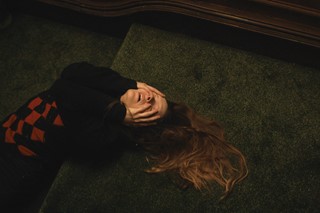Actor Morfydd Clark and writer-director Rose Glass unpack Saint Maud, a chilling new horror film that explores the relationship between religion and mental health
“When I can bring myself to watch horror, I find it incredibly rewarding,” says Morfydd Clark, the Welsh actor and star of Saint Maud – the most fiercely anticipated film of the genre to come out this year – which has been picked up by A24 (Uncut Gems, Hereditary, Lady Bird, Moonlight and more). “I find sad horrors very difficult,” she continues, “I watched Goodnight Mommy and it was just so sad as well as terrifying that I was like, ‘I can only watch The Bogeyman from now on.’ Social horrors are the ones that really send me into a terrible spiral, in a way that makes me a better person.”
Saint Maud, then, seems exactly the kind of film someone of Clark’s disposition might steer away from. But shot mostly in a school in Islington – with a mid-December stint in Scarborough, where the film is set – Clark’s first lead role explores the relationship between religion and mental health through the sometimes gruesome lens of horror. Having experienced a never-fully-explained trauma while working for the NHS, Clark’s Maud becomes a private healthcare worker whose first patient is a celebrated former dancer called Amanda (Jennifer Ehle).
“I was raised Christian and I’m a pretty neurotic person,” explains writer-director Rose Glass of the film’s genesis. “It’s only in the last few years that I’ve started to think critically and with more self-awareness about both subjects and how they connect: Saint Maud is just what came naturally.” Despite being a relative stranger before joining the project, Clark immediately identified with the themes in Glass’s script. “I have a lot of thoughts but I don’t have stories in me, so reading it was like ‘this is what I’d write if I could write’,” she enthuses. “I’m not religious, but my dad’s been in and out of faith and I’ve always found that interesting.”

Maud’s connection to God is born from her earlier professional distress, by the time she meets Amanda her religion is overwhelming her. From her modest appearance (the scraped back ponytail and modern tunic and trousers of an earlier scene are replaced with a low pony and more conservative uniform dress and wool tights when she arrives at Amanda’s) to her internal dialogue, everything she does either alludes to or is outright propelled by Him. This intensity similarly frames her behaviour and interactions with Amanda, who entertains her faith by asking questions, and later gifting Maud, “my saviour”, a William Blake book. Lines are inevitably blurred, and the pair’s relationship ends after an uncomfortable scene at a party.
“I'm interested in human behaviour and why we do the things we do,” says Glass. “I like finding out what makes people tick; the weirder the better.” For Clark, the role meant looking inwards. “I don’t become someone else when I’m acting at all,” she says, instead searching for the parts of herself that relate to the role she’s playing. “I’ve often felt that there’s a parallel world where I’m very lonely because I’ve argued too much and haven’t apologised enough and that’s something that chills my nightmares, so this idea of playing someone incredibly lonely is a particular horror of mine.” Loosely in tandem with playing Maud were roles in Eternal Beauty and His Dark Materials – Craig Roberts’ recent feature and the BBC One show respectively – both of which saw Clark play women who “were seen as not fitting in, and therefore seeming to be frightening or dangerous,” and subsequently bled into the character.
In addition to examining her own behaviours, research fell on those around her; many family members are doctors or nurses. “Growing up with someone who was being worked very hard in the NHS, I have been quite fascinated by how people did this work,” she says. “There were occasions where my mum was deeply affected by something at work, and I couldn’t understand how she ever managed to compartmentalise. Reading Maud made sense because I was like yeah, if I was working in the health service without support, I would struggle hugely.” Engaging with early feedback for the film, which had its world premiere at TIFF in 2019, Clark found others currently working in the sector concurred. “They were glad they saw it but it was very painful,” she says. “I’m so glad we’ve made a film that makes sense, but that it does ring true in some ways, that’s been sad, to see that this horror is not far from people’s worlds who are doing the most important, most thankless work.”
On set, any mental health concerns of her own were lifted by Ehle, who volunteered her care. “I don’t know if I’d have been able to do it if it hadn’t been with someone so lovely. Also Rose – having the three of us together was really special. Three quite quiet introverted people who got to be quiet and introverted together.” That the film was her debut lead (she’s on screen throughout), Glass’s debut feature, and a first for several other crew members created a productive and ultimately united atmosphere. “This film was a big deal for a lot of us,” agrees Glass, “the personal stakes felt high and everyone threw themselves into it. I’m aware it’s boring and nauseating to say how bloody nice everyone was, how much fun we had. But we really did and they really were.”
Saint Maud is in cinemas now.
